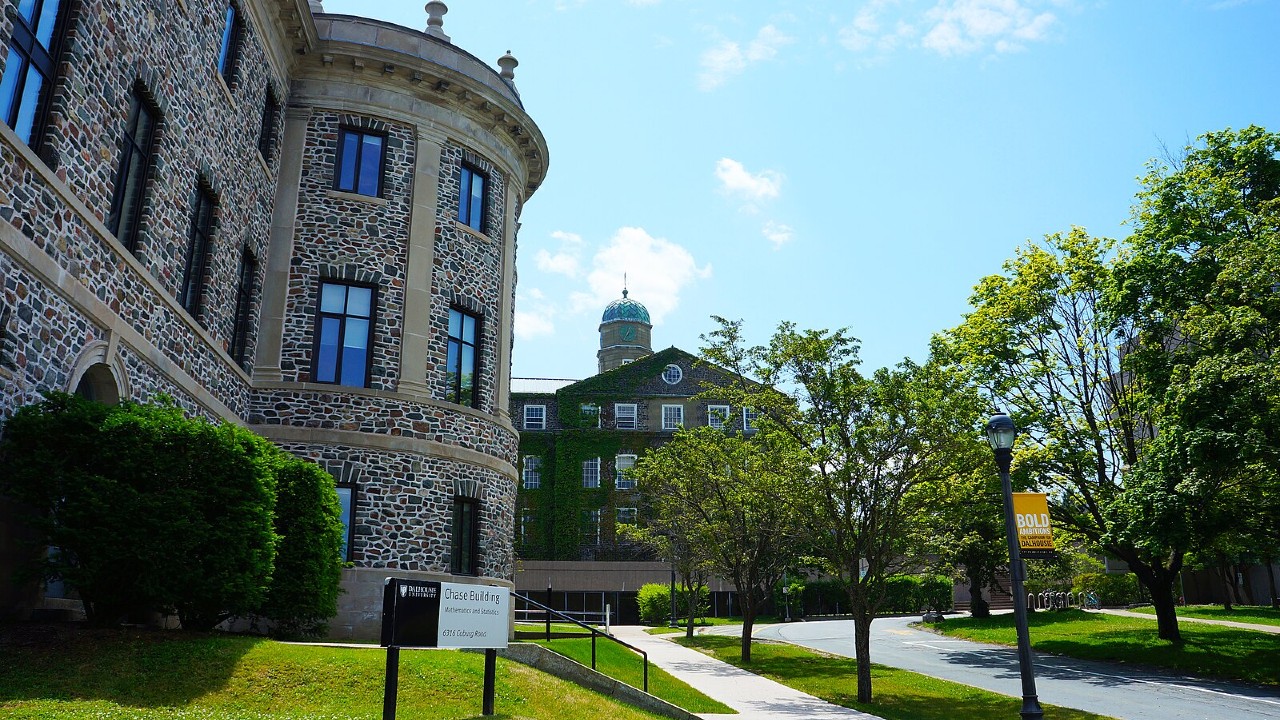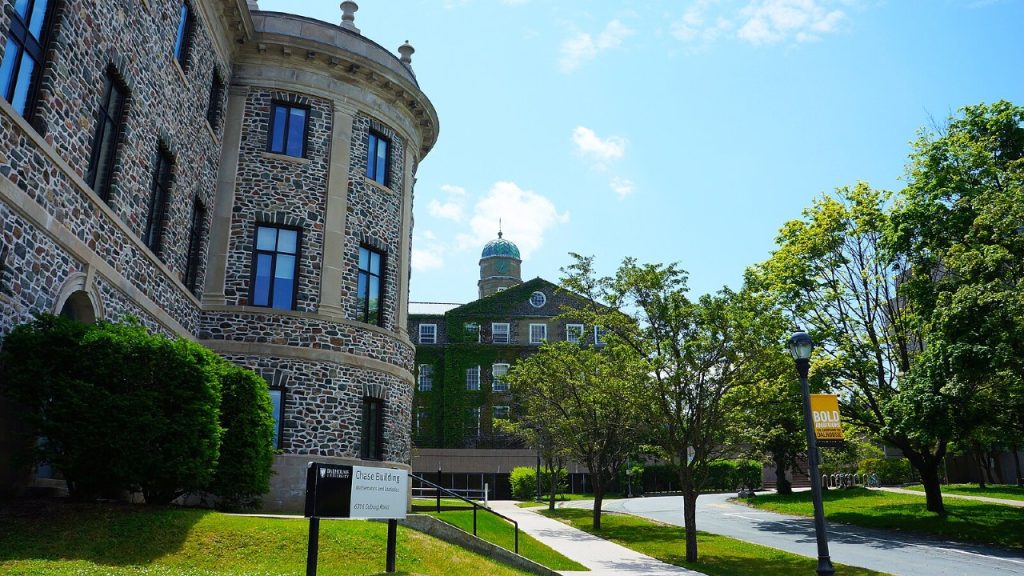Table of Contents
ToggleFounded in 1818, Dalhousie University has evolved into one of Nova Scotia’s largest public research institutes. It offers over 80 postgraduate courses, 140+ undergraduate degrees and certificates, and 7 professional courses. The campus hosts approximately 20,000 students, including 4,800 international students from 70 countries. Enrolling at Dalhousie University requires consideration of factors such as admission percentage, eligibility, and the cost of studying. Currently, the Dalhousie University acceptance rate is around 78%. Our guide compiles all necessary information for prospective Dalhousie University applicants.
Why Study at Dalhousie University?
There are several reasons why hundreds of international students choose to migrate to Canada and enrol at Dalhousie University. Some of the top reasons why it may be the best choice for you are listed below.
- Dalhousie University has been ranked #298 by QS World University Rankings.
- It has been ranked #1 in Nova Scotia and #14 in Canada.
- For their courses related to Wildlife and Fisheries Management and Conservation, they have been ranked #35 out of 2,946 institutes.
- They provide hands-on learning in several research-intensive courses that encourage students to achieve excellence.
- They have a faculty-student ratio of 17:1, which allows the students to focus in classes and lectures better.
- Dalhousie has a welcoming, all-inclusive community that makes students feel comfortable and at home.
- Dalhousie University invests millions of dollars every year for students’ scholarships, grants, awards and other financial aid.
- They have several student exchange programmes with other universities that help the students gain exposure and learn about other institutes, as well.
Top Courses
As mentioned earlier, Dalhousie University offers 180+ flexible courses, enabling students to align their studies with their career goals. Explore popular programs for international students and their average durations.
| Programmes | Duration |
| MS | 1 – 3 years |
| BE/BTech | 4 – 5 years |
| BBA | 2 – 4 years |
| MEng | 1 – 2 years |
| BSc | 4 years |
| BA | 4 years |
| MA | 1 – 3 years |
| MASc | 18 months – 27 months |
Dalhousie University Acceptance Rate
The acceptance rate is a crucial statistic to consider before the admission process as it provides valuable insight into the exclusivity and competition surrounding the university’s enrollment procedure. The acceptance rate for international students at Dalhousie University is approximately 78%.
It suggests that the institute’s Admissions Team is moderately selective, and applicants can gain admission easily by maintaining a strong academic record and meeting the university’s requirements. It’s important to note that the admission percentage does not reflect the university’s standard of education, global reputation, opportunities, or available facilities.
Admission Requirements & Eligibility Criteria
Understanding the impact of Dalhousie University’s acceptance rate on the admission process is crucial. Once this is clear, focus on eligibility criteria and admission requirements. Ensure you meet these prerequisites to secure your seat at the institute.
- A minimum aggregate of 70% in high school diploma.
- A bachelor’s degree of 4 years. (for master’s applicants)
- A minimum GPA of 3.0 on a scale of 4.0 in UG degree.
- Official academic transcripts of all previous degrees
- Scores of entrance exams (if applicable)
- Scores of English proficiency tests
- Letters of recommendation (minimum 2)
- Statement of purpose
- CV/Resume
- Financial documents
- An interview may be conducted (not mandatory)
- Bachelor’s applicants must pay an application fee of CAD 70.
- Master’s applicants must pay an application fee of CAD 110.
The minimum scores required by the university in different entrance exams are as follows. Students must aim to score higher than these to increase their chances of beating the Dalhousie University acceptance rate.
Students can expect the Admissions Team to release the results four to six weeks after the deadlines. However, these dates are liable to change depending on the course and department.
How To Apply?
Now that we are aware of the Dalhousie University acceptance rate let us look at the application process. Dalhousie University is quite simple to follow, below is a step-by-step guide.
- You can apply through the university’s official admission portal, available on their website.
- Input your personal and educational credentials in the designated fields to move on to the next step.
- Select the course you want to pursue.
- Upload all the compiled documents to the application. Ensure that your name, date of birth and other details on the application match those on the official documents.
- Students are required to pay an application fee of CAD 70 and CAD 110 for bachelor’s and master’s applicants, respectively.
Students are advised to complete this application process as soon as possible. This way, you will have ample time to process your visa application, finances or other formalities before the classes officially commence.
Intakes & Deadlines
The Dalhousie University acceptance rate depends on several factors, one of which is the available intake. Universities typically offer different courses and have varying vacancies depending on the intake, because of which the admission percentage may change.
Dalhousie University offers its applicants three admission intakes – September, January and May. The application deadlines for each of these are mentioned below.
| Intake | Deadline |
| September Intake | April 1 |
| January Intake | August 31 |
| May Intake | December 31 |
Cost Of Studying
The cost of studying is a crucial consideration in the decision-making process, as finances significantly impact the admission procedure. We can categorise the cost into two parts: tuition fees and living expenses.
The average tuition fee for international students is around CAD 20,350. The expected tuition according to the different disciplines is mentioned in the table below.
| Domain | Tuition Fees (CAD) |
| Undergraduate Arts & Social Sciences | CAD 18,700 |
| Graduate Arts & Social Sciences | CAD 16,500 |
| Undergraduate Engineering | CAD 25,500 |
| Graduate Engineering | CAD 22,500 |
| Undergraduate Natural Sciences | CAD 20,500 |
| Graduate Natural Sciences | CAD 18,500 |
Apart from tuition fees, it’s essential to factor in the cost of living. The annual living expenses in Nova Scotia amount to CAD 28,800, covering transportation, accommodation, food, and recreation. Refer to the table below for a detailed breakdown of these costs.
| Item | Estimated cost per month |
| Off-Campus Accommodation | CAD 966 |
| On-Campus Accommodation | CAD 1,035 |
| Food | CAD 720 |
| Transportation | CAD 83 |
| Utilities | CAD 205 |
| Entertainment | CAD 60 |
| Groceries | CAD 80 |
| Clothes | CAD 142 |
| Health Insurance | CAD 75 |
| Total Cost Of Living With Off-Campus Accommodation | CAD 2,331 |
| Total Cost Of Living With On-Campus Accommodation | CAD 2,400 |
| Annual Cost Of Living | CAD 28,800 |
Scholarships
To aid the cost of living and tuition fees, Dalhousie University offers several scholarships to international students depending on their academic merit, records, and financial background. Depending on the nature of the financial aid, students may have to apply through their website. Here are the most helpful scholarships for international students.
| Programme | Scholarship | Awarded Amount |
| Undergraduate | CorpFinance International Limited Indian Scholarship | CAD 15,000 |
| Undergraduate | Dalhousie University Award | CAD 40,790 |
| Master’s | Killam Predoctoral Scholarship Level One | CAD 42,000 per year for up to two years. CAD 2,500 per term for tuition fees. |
| Ph.D. | Killam Predoctoral Scholarship Level Two | CAD 42,000 annually for up to three years. |
| Master’s & PhD | Vitamin Scholarship | CAD 19,000 for master’s students. CAD 21,000 for up to 2 years for doctoral students. |
| Ph.D. | Nova Scotia Graduate Scholarship | CAD 60,000 |
| Ph.D. | President’s Awards | CAD 15,000 annually for 4 years. |
Career Prospects
Dalhousie University provides students with diverse research opportunities, spanning from regional to international levels. It cultivates a supportive and intellectually stimulating environment for learning.
Dalhousie University boasts an extensive network, offering students opportunities for internships and part-time positions with renowned companies, firms, research institutes, and government bodies. These experiences provide invaluable practical insights into the professional world.
FAQs – Dalhousie University Acceptance Rate
Q1. Is Dalhousie University hard to get into?
Ans: Dalhousie University acceptance rate is quite high. Hence, as long as the applicants have a solid academic record and fulfil the institute’s requirements, they stand a good chance at admission.
Q2. What is the Dalhousie University acceptance rate for master’s students?
Ans: Dalhousie University acceptance rate for masters is around 78%.
Q3. What are the deadlines for international students to apply to Dalhousie University?
Ans: The deadlines for international students to apply to Dalhousie University are 1st April for the September intake, 31st August for the January intake, and 31st December for the May intake.
Q4. What are the popular study abroad programmes and majors at Dalhousie?
Ans: Law, Engineering, Aerospace, Natural Sciences, Mathematics, Statistics, Earth and Marine Sciences, Life Sciences, Business, Economics, Finance, Medicine, Social Sciences, Arts, Languages, Computer Science, and Psychology are the popular study abroad programmes and majors at Dalhousie.
Q5. Are there any specific admission requirements or criteria that can affect the Dalhousie University acceptance rate for international students?
Ans: Admission requirements for international students at Dalhousie University tend to vary depending on the chosen programme. Some of the common prerequisites include official academic transcripts, English proficiency tests, letters of recommendation, a statement of purpose, and scores of entrance exams like the SAT or ACT, although the last one may not be mandatory.
Strong academic performance, relevant extracurriculars, and a well-written personal essay can positively influence chances of enrolment. Additionally, demonstrate how you are unique from the other candidates and why you would prove to be a valuable addition to the university.
Thank you for reading our guide to the Dalhousie University acceptance rate! Let us know your thoughts or queries in the comments section below!


















1 thought on “Top PGDM Courses In Canada: Universities & Eligibility”
I have done Bachelor’s in Culinary Arts from India and completed my graduation in the year 2022 .I am 22 years old. After graduation, I have done 1 year paid internship from USA .Now, I would like to take occupational experience and learn culinary skills and also do masters in Culinary arts.How can I find the college n best course / country where I can persue studying further